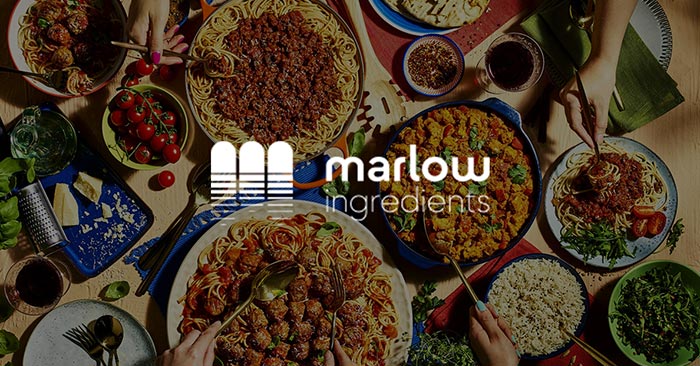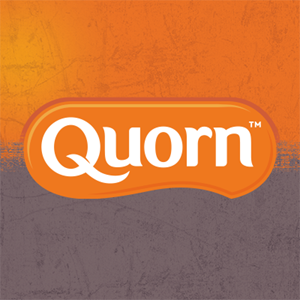Citing ‘Urgent’ Climate Crisis, Quorn’s Parent Company Opens B2B Ingredient Division

U.K.-based Marlow Foods, owner of legacy plant-based meat alternative brand Quorn, announced this week the launch of a new division to begin selling its flagship mycoprotein ingredient to other food and beverage companies.
Known as Marlow Ingredients, the new division will begin selling mycoprotein – a key nutritional ingredient in Quorn products – to manufacturers in Europe before expanding internationally. Quorn and Marlow are subsidiaries of Filipino conglomerate Monde Nissin Corp.
“We have been trailblazers in meat free since we sold our first Quorn product in 1985,” said Marlow Foods CEO Marco Bertacca in a press release. “We see it as our responsibility to provide healthy food for people and planet.”
Marlow’s mycoprotein is derived from a filamentous fungi known as Fusarium venenatum and contains amino acids and a high fiber content (beta-glucan). According to the company, mycoprotein is developed through fermentation, setting it apart from other plant-based protein sources like pea and soy which are extracted through alternative processes such as dry milling or washing.
The company said mycoprotein requires 90% less land and water to manufacture than “equivalent” beef products and produces 98% fewer carbon emissions.
In the release, the company said it had decided to open mycoprotein up to the market due to climate change and a need for urgent action to curb rising temperatures. Marlow cited a recent U.N. Intergovernmental Panel on Climate Change (IPCC) report which found carbon emissions must be halved by 2030 in order to limit the global temperature rise to 1.5 degrees Celsius.
Speaking to NOSH, Tom Lindley, head of strategy and marketing for Marlow Ingredients, said the company hopes that by making mycoprotein more available it will help grow the size of the plant-based protein category overall and drive more consumers into the space.
“We started thinking ‘How many meals do we need to serve in order to really make a significant difference on the sustainability of this planet?’” Lindley said. “And so from that perspective, we were thinking ‘what more can we do? How do we make this bigger? How do we take this further? How do we have a bigger impact on the world?’ And that’s where this idea came from.”
Lindley suggested that mycoprotein could be used to develop blended meat products, providing beef and other animal-based food manufacturers an added ingredient that can reduce the amount of animal proteins in a given product.
“If you’re currently making a burger or a sausage that’s made with 100% processed meat, if you make that with 55% processed meat and 45% mycoprotein then you’re still helping the environment, you’re still helping people live a healthier life,” he said.
Founded in 1985, Quorn is the only commercial manufacturer of mycoprotein products worldwide. In addition to kitchen ingredients, the brand produces a variety of meat alternatives including frozen ChiQin Patties, cutlets, filets and wings, as well as a beef-styled meat-free burger. Most recently the brand expanded its ChiQin line last spring with frozen Kickin’ Meatless ChiQin Wings and Pineapple Chipotle Meatless ChiQin Dippers products.
In recent years the brand has faced competition from other alternative protein meat alternatives that also utilize fermentation, such as Meati which uses a mycelium protein sourced from mushroom roots.
Marlow Ingredients will actively focus on selling mycoprotein to European manufacturers to start, as the company’s fermentation facility is located in Northern England, but Lindley said the company is open to working with overseas customers as well including Americans if the opportunity arises.
While the brand has historically been focused on the European market, Quorn has upped its U.S. expansion efforts in recent years. In 2021, Quorn Foods USA announced it intended to triple its marketing budget in 2022 as it built out its retail and foodservice presence. The company opened a culinary development center in Dallas, Texas in August 2021.
In an earnings report last month, Monde Nissin announced Quorn sales grew 0.8% in 2022 driven by price increases, foodservice growth and U.K. retail market share improvement. However, core gross profit fell by 17.1% as the higher interest rates and risk premiums, overall decline in the meat alternatives market, and costs associated with the U.S. expansion weighed on the division.
“We continue to believe in the long-term growth potential for sustainably produced and clean label alternative proteins,” Monde Nissin CEO Henry Soesanto stated in the earnings report. “We are the world’s largest producer of mycoprotein which fits all these attributes and is a key differentiator for us.”


















